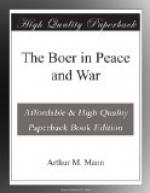His successor in office, President Reitz, was not credited with anything in particular, but it was understood that should the Volksraad decide to co-operate with the Transvaal in any instance, he would willingly give his consent. This was confirmed when Dr. Jameson’s entrance into the Transvaal was made known. Three districts of the Free State were promptly commandeered, and burghers swarmed to the border.
[Illustration: A Boer Encampment]
About the same time President Reitz vacated his office, and President Steyn is now at the head of affairs. President Steyn has now conclusively shown his sympathy with the Transvaal, and his occasional interviews with Oom Paul were presumably for the purpose of ratifying the compact from time to time. This is confirmed by the fact that the Volksraad some considerable time ago proclaimed that, when hostilities broke out in the Transvaal, the burghers were to hold themselves in readiness to proceed to the border. This was not merely with the object of protecting the border, but to render assistance to those across the border, and now they have joined their neighbours in invading Natal.
The feeling amongst Englishmen in the Free State was, of course, strong, but Englishmen are not considered in the matter at all. If they are burghers of the State, they must perforce conform to the laws thereof, and fight to the death even against their own relations. If they refuse to go to the front, it is not certain what would happen.
There is another aspect of the question, and a serious one, too. When the Free State burghers were called to the border, and war was actually declared, they feared that they would return to their homes only to find that their wives and children had been murdered, their cattle stolen, and their property burnt to the ground. This new and terrible danger came from Basutoland. The Basutos have a grudge against the Boers, and they were only waiting an opportunity to wipe out that grudge for ever. They are a warlike race, they are well supplied with arms, and their horsemanship is notorious. They like the Englishman, but they look upon the Boer as something to wipe off the face of the earth. Of course, their discrimination between English and Dutch when the time comes for them to take action, if it ever does come, will not save the Englishmen in the Free State.
The Basuto question may not have escaped the notice of the Volksraad in their anxiety to assist their brethren in the Transvaal, but their action would seem to indicate that it had. Had they been wise, they would have left their sister country to settle its own affairs, and have looked nearer home for something to do; but this view, although now too late, may already have engaged their attention.




